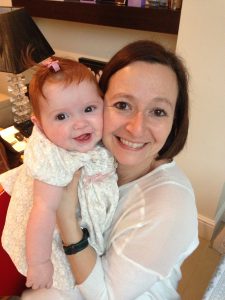
Margot, with her auntie Nadia
Giving, granting and donation are words used by philanthropists and their advisors. In most cases these words relate to money. Charitable giving revolves around wealth investment and links to charities and causes that are close to people’s hearts. In the UK, this has been demonstrated by donations of individuals, foundations and corporations over the last 10 years of nearly £15 billion[1].
However the word “giving” has a much wider meaning. We can give our time, expertise and something that isn’t normally discussed, giving a part of ourselves to help others.
While most of us can give blood and register as potential stem cell or bone marrow donors, and all of us can sign up to register as organ donors, the statistics are not encouraging. Only 4% of the UK population gives blood and only 36% is on the NHS Organ Donor Register[2]. Worst still is that only 2% have registered as potential stem cell or bone marrow donors.
The reasons for the poor uptake is due to lack of awareness, misinformation, an irrational fear of donating, and in a lot of cases, we just don’t like to talk about illness and death. These dismal statistics are even harder to absorb when we know that you don’t need to be wealthy in order to give in this way.
So we believe that this type of giving needs to be discussed at an early age so that when reaching the age of consent, giving a part of ourselves to help others becomes the norm rather than the exception.
This would result in an overall positive in that patients would remain clinically well and / or have a better quality of life. It would also reduce the financial implications involved with having to medically maintain patients and would save on the time and costs involved in searching for donors from outside the UK.
It is also important to remember the impact that family discussions can have on behaviour. In a recent 2017 study by Kidzania and Havas Helia[3], it was reported that parents, guardians and extended family members are one of the biggest influences on the aspirations of a child. The same report also found that the choices made at 14-years-old by both genders were strikingly similar to those made by four-year-olds.
Therefore we need to start educating our primary school children now in an age appropriate way with the hope that this education converts them into altruistic donors. In the meantime, these learnings may filter into their homes encouraging their grown ups to take positive action.
Irrespective of our socio-economic background, we believe we can all become philanthropists and promote the welfare of others following the Greek definition of the word – kindliness, humanity, benevolence and love to mankind.
Team Margot
Together, saving lives
[1] Coutts Million Pound Donors Report 2017
[2] NHS Blood and Transplant
[3] Dr Ger Graus OBE –“Children can only aspire to what they know exists.” Making role-play real play: Building a creative approach to social mobility. KidZania and Havas Helia.
Team Margot’s mission
To help save and improve lives by educating, inspiring and motivating people, especially from ethnically diverse communities, to register as blood, organ, stem cell and bone marrow donors and to provide a range of support to families caring for child cancer patients.
Team Margot also provides secretariat support to the All-Party Parliamentary Group for Ethnicity Transplantation and Transfusion.